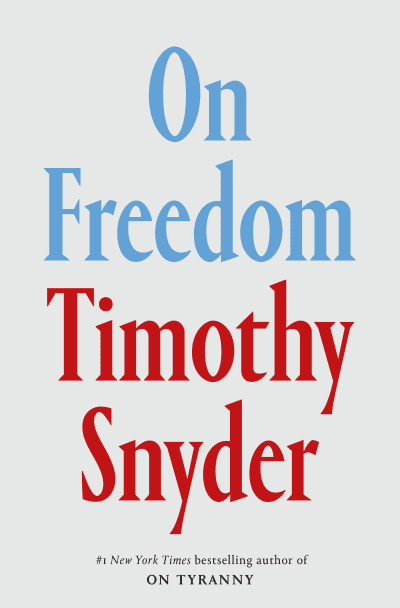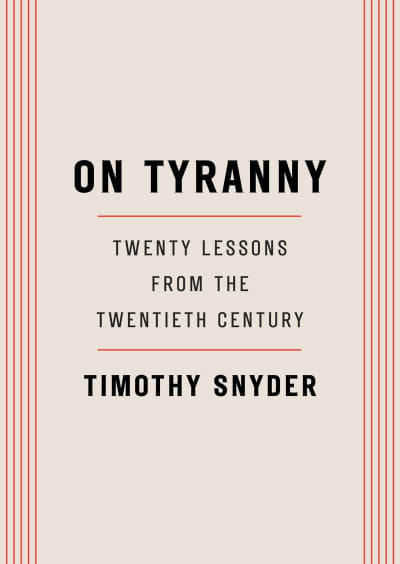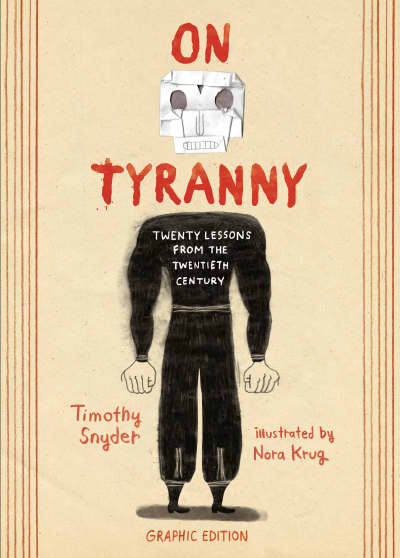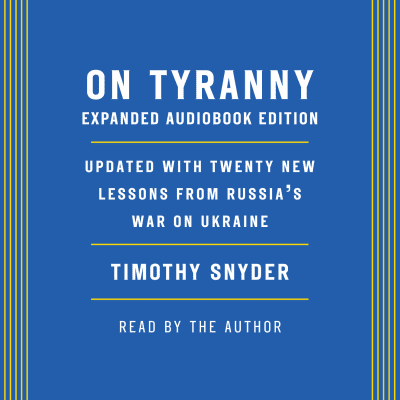Books
Freedom is the great American commitment, but as Snyder argues, we have lost sight of what it means—and this is leading us into crisis. Too many of us look at freedom as the absence of state power: We think we’re free if we can do and say as we please, and protect ourselves from government overreach. But true freedom isn’t so much freedom from as freedom to—the freedom to thrive, to take risks for futures we choose by working together. Freedom is the value that makes all other values possible.
On Freedom takes us on a thrilling intellectual journey. Drawing on the work of philosophers and political dissidents, conversations with contemporary thinkers, and his own experiences coming of age in a time of American exceptionalism, Snyder identifies the practices and attitudes—the habits of mind—that will allow us to design a government in which we and future generations can flourish. We come to appreciate the importance of traditions (championed by the right) but also the role of institutions (the purview of the left). Intimate yet ambitious, this book helps forge a new consensus rooted in a politics of abundance, generosity, and grace.
On Tyranny
The Founding Fathers tried to protect us from the threat they knew, the tyranny that overcame ancient democracy. Today, our political order faces new threats, not unlike the totalitarianism of the twentieth century. We are no wiser than the Europeans who saw democracy yield to fascism, Nazism, or communism. Our one advantage is that we might learn from their experience.
On Tyranny is a call to arms and a guide to resistance, with invaluable ideas for how we can preserve our freedoms in the uncertain years to come.

Our Malady
On December 29, 2019, historian Timothy Snyder fell gravely ill. Unable to stand, barely able to think, he waited for hours in an emergency room before being correctly diagnosed and rushed into surgery. Over the next few days, as he clung to life and the first light of a new year came through his window, he found himself reflecting on the fragility of health, not recognized in America as a human right but without which all rights and freedoms have no meaning.
And that was before the pandemic. We have since watched American hospitals, long understaffed and undersupplied, buckling under waves of ill patients. The federal government made matters worse through willful ignorance, misinformation, and profiteering. Our system of commercial medicine failed the ultimate test, and thousands of Americans died.
In this eye-opening cri de coeur, Snyder traces the societal forces that led us here and outlines the lessons we must learn to survive. In examining some of the darkest moments of recent history and of his own life, Snyder finds glimmers of hope and principles that could lead us out of our current malaise. Only by enshrining healthcare as a human right, elevating the authority of doctors and medical knowledge, and planning for our children’s future can we create an America where everyone is truly free.
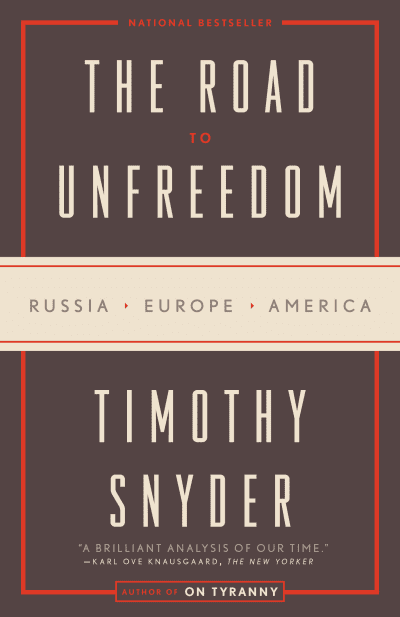
The Road to Unfreedom
“A brilliant analysis of our time.”—Karl Ove Knausgaard, The New Yorker
With the end of the Cold War, the victory of liberal democracy seemed final. Observers declared the end of history, confident in a peaceful, globalized future. This faith was misplaced. Authoritarianism returned to Russia, as Vladimir Putin found fascist ideas that could be used to justify rule by the wealthy. In the 2010s, it has spread from east to west, aided by Russian warfare in Ukraine and cyberwar in Europe and the United States.
Russia found allies among nationalists, oligarchs, and radicals everywhere, and its drive to dissolve Western institutions, states, and values found resonance within the West itself. The rise of populism, the British vote against the EU, and the election of Donald Trump were all Russian goals, but their achievement reveals the vulnerability of Western societies.
In this forceful and unsparing work of contemporary history, based on vast research as well as personal reporting, Snyder goes beyond the headlines to expose the true nature of the threat to democracy and law. To understand the challenge is to see, and perhaps renew, the fundamental political virtues offered by tradition and demanded by the future. By revealing the stark choices before us--between equality or oligarchy, individuality or totality, truth and falsehood--Snyder restores our understanding of the basis of our way of life, offering a way forward in a time of terrible uncertainty.
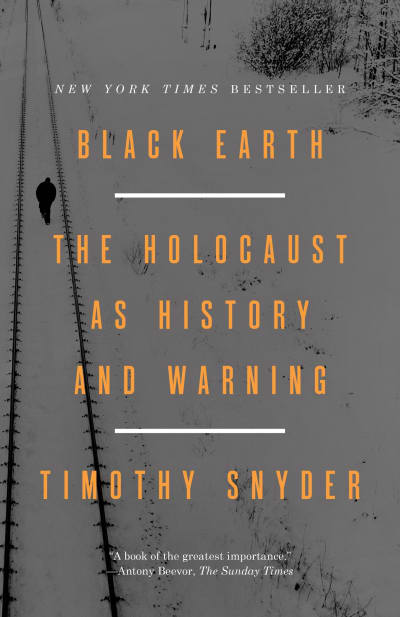
Black Earth
A “gripping [and] disturbingly vivid” (The Wall Street Journal) portrait of the defining tragedy of our time, from the #1 New York Times bestselling author of On Tyranny
ONE OF THE BEST BOOKS OF THE YEAR—The Washington Post, The Economist, Publishers Weekly
In this epic history of extermination and survival, Timothy Snyder presents a new explanation of the great atrocity of the twentieth century, and reveals the risks that we face in the twenty-first. Based on untapped sources from eastern Europe and forgotten testimonies from Jewish survivors, Black Earth recounts the mass murder of the Jews as an event that is still close to us, more comprehensible than we would like to think and thus all the more terrifying.
By overlooking the lessons of the Holocaust, Snyder concludes, we have misunderstood modernity and endangered the future. The early twenty-first century is coming to resemble the early twentieth, as growing preoccupations with food and water accompany ideological challenges to global order. Our world is closer to Hitler’s than we like to admit, and saving it requires us to see the Holocaust as it was—and ourselves as we are.
Groundbreaking, authoritative, and utterly absorbing, Black Earth reveals a Holocaust that is not only history but warning.
New York Times Editors’ Choice • Finalist for the Samuel Johnson Prize; the Mark Lynton History Prize; the Arthur Ross Book Award
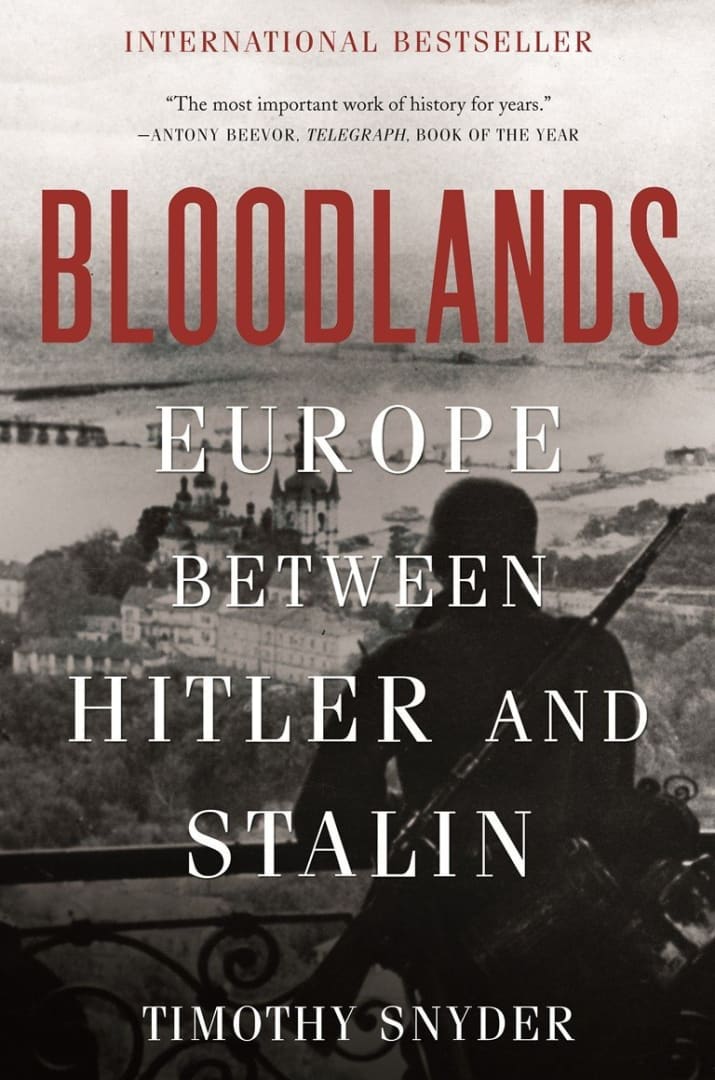
Bloodlands
Americans call the Second World War “The Good War.” But before it even began, America’s wartime ally Josef Stalin had killed millions of his own citizens—and kept killing them during and after the war. Before Hitler was finally defeated, he had murdered six million Jews and nearly as many other Europeans. At War’s end, both the German and the Soviet killing sites fell behind the Iron Curtain, leaving the history of mass killing in darkness.
Bloodlands is a new kind of European history, presenting the mass murders committed by the Nazi and Stalinist regimes as two aspects of a single history, in the time and place where they occurred: between Germany and Russia, when Hitler and Stalin both held power. Assiduously researched, deeply humane, and utterly definitive, Bloodlands will be required reading for anyone seeking to understand the central tragedy of modern history.

The Red Prince
Wilhelm Von Habsburg wore the uniform of the Austrian officer, the court regalia of a Habsburg archduke, the simple suit of a Parisian exile, the collar of the Order of the Golden Fleece, and, every so often, a dress. He could handle a saber, a pistol, a rudder, or a golf club; he handled women by necessity and men for pleasure. He spoke the Italian of his archduchess mother, the German of his archduke father, the English of his British royal friends, the Polish of the country his father wished to rule, and the Ukrainian of the land Wilhelm wished to rule himself. In this exhilarating narrative history, prize-winning historian Timothy D. Snyder offers an indelible portrait of an aristocrat whose life personifies the wrenching upheavals of the first half of the twentieth century, as the rule of empire gave way to the new politics of nationalism. Coming of age during the First World War, Wilhelm repudiated his family to fight alongside Ukrainian peasants in hopes that he would become their king. When this dream collapsed he became, by turns, an ally of German imperialists, a notorious French lover, an angry Austrian monarchist, a calm opponent of Hitler, and a British spy against Stalin. Played out in Europe’s glittering capitals and bloody battlefields, in extravagant ski resorts and dank prison cells, The Red Prince captures an extraordinary moment in the history of Europe, in which the old order of the past was giving way to an undefined future-and in which everything, including identity itself, seemed up for grabs.
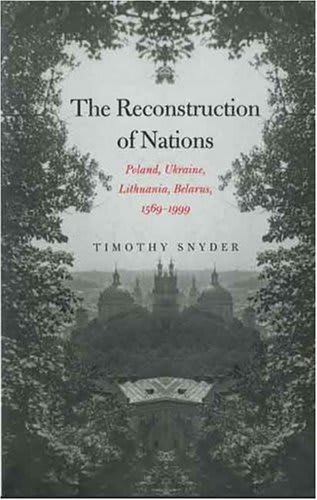
The Reconstruction of Nations
Modern nationalism in northeastern Europe has often led to violence and then reconciliation between nations with bloody pasts. In this fascinating book, Timothy Snyder traces the emergence of Polish, Ukrainian, Lithuanian, and Belarusian nationhood over four centuries, discusses various atrocities (including the first account of the massive Ukrainian-Polish ethnic cleansings of the 1940s), and examines Poland’s recent successful negotiations with its newly independent Eastern neighbors, as it has channeled national interest toward peace.
ACCLAIM:
George Louis Beer Prize, American Historical Association, 2003
Przegląd Wschodni (Eastern Review) Best Foreign Academic Book, 2003
American Association for Ukrainian Studies Book Prize, shared, 2004
Jerzy Giedroyc Scholarly Award, Marie Curie-Skłodowska University, 2008
Honorable mention, Orbis-AAASS Book Prize in Polish Studies, 2004
Notable books for 2004, Philadelphia Inquirer

Sketches from a Secret War
The forgotten protagonist of this true account aspired to be a cubist painter in his native Kyïv. In a Europe remade by the First World War, his talents led him to different roles-intelligence operative, powerful statesman, underground activist, lifelong conspirator. Henryk Józewski directed Polish intelligence in Ukraine, governed the borderland region of Volhynia in the interwar years, worked in the anti-Nazi and anti-Soviet underground during the Second World War, and conspired against Poland's Stalinists until his arrest in 1953. His personal story, important in its own right, sheds new light on the foundations of Soviet power and on the ideals of those who resisted it. By following the arc of Józewski's life, this book demonstrates that his tolerant policies toward Ukrainians in Volhynia were part of Poland's plans to roll back the communist threat. The book mines archival materials, many available only since the fall of communism, to rescue Józewski, his Polish milieu, and his Ukrainian dream from oblivion. An epilogue connects his legacy to the disintegration of the Soviet Union and the democratic revolution in Ukraine in 2004.
Distinctions:
Pro Historia Polonorum, for best book on Polish history by a foreign scholar in the previous five years, 2008.
Shortlisted as one of three books for the main Polityka history prize, 2009.
Shortlisted as one of nine books for the Moczarski history prize, 2009.
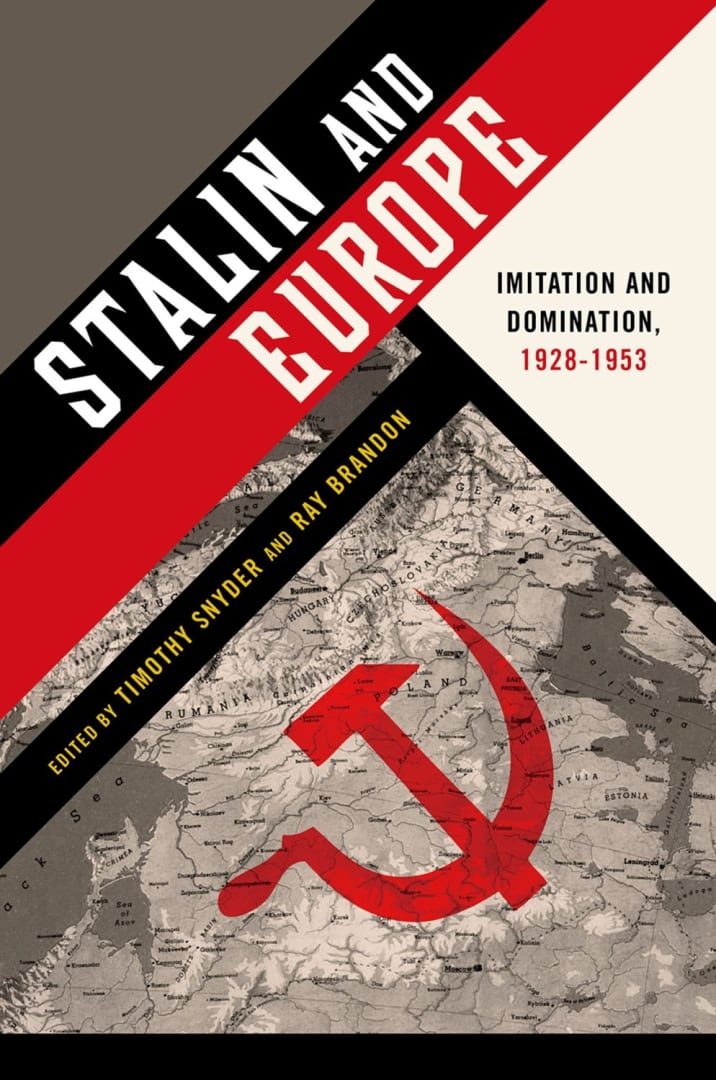
Stalin and Europe
The Soviet Union was the largest state in the twentieth-century world, but its repressive power and terrible ambition were most clearly on display in Europe. Under the leadership of Joseph Stalin, the Soviet Union transformed itself and then all of the European countries with which it came into contact. This volume considers each aspect of the encounter of Stalin with Europe: the attempt to create a kind of European state by accelerating the European model of industrial development in the USSR; mass murder in anticipation of a war against European powers; the actual contact with Europe’s greatest power, Nazi Germany, first as ally and then as enemy; four years of war fought chiefly on Soviet territory and bringing untold millions of deaths, including much of the Holocaust; and finally the reestablishment of the Soviet system, not just in prewar territory of the USSR, but in Western Ukraine, Western Belarus, the Baltic States, Poland, Czechoslovakia, Romania, Hungary, Bulgaria, and East Germany.

Nationalism, Marxism, and Modern Central Europe
Winner of the Oskar Halecki Book Prize for Polish and East European History
Timothy Snyder opens a new path in the understanding of modern nationalism and twentieth-century socialism by presenting the often overlooked life of Kazimierz Kelles-Krauz, an important Polish thinker at the beginning of this century. During his brief life in Poland, Paris, and Vienna, Kelles-Krauz influenced or infuriated most of the leaders of the various socialist movements of Central Europe and France. His central ideas ultimately were not accepted by the socialist mainstream at the time of his death. However, ninety years later, we see that they anticipated late twentieth-century understanding on the importance of nationalism as a social force and the parameters of socialism in political theory and praxis. Kelles-Krauz was one of the only theoreticians of his age to advocate Jewish national rights as being equivalent to, for example, Polish national rights and he correctly saw the struggle for national sovereignty as being central to future events in Europe. Specialists will welcome this first major monograph in English devoted to Kelles-Krauz. Students will also find helpful biographical guides, maps, and personal photographs of Kelles-Krauz, his colleagues, and his family.

The Wall around the West
Even as economic and military walls have come down in the post-Cold War era, states have rapidly built new barriers to prevent a perceived invasion of 'undesirables.' Nowhere is this more dramatically evident than along the geographic fault lines dividing rich from poor countries: especially the southern border of the United States, and the southern and eastern borders of the European Union. This volume examines the practice, politics, and consequences of building these new walls in North America and Europe. At the same time, it challenges dominant accounts of globalization, in which state borders will be irrelevant to the human experience. In short, the volume brings borders back in to the study of international politics.
